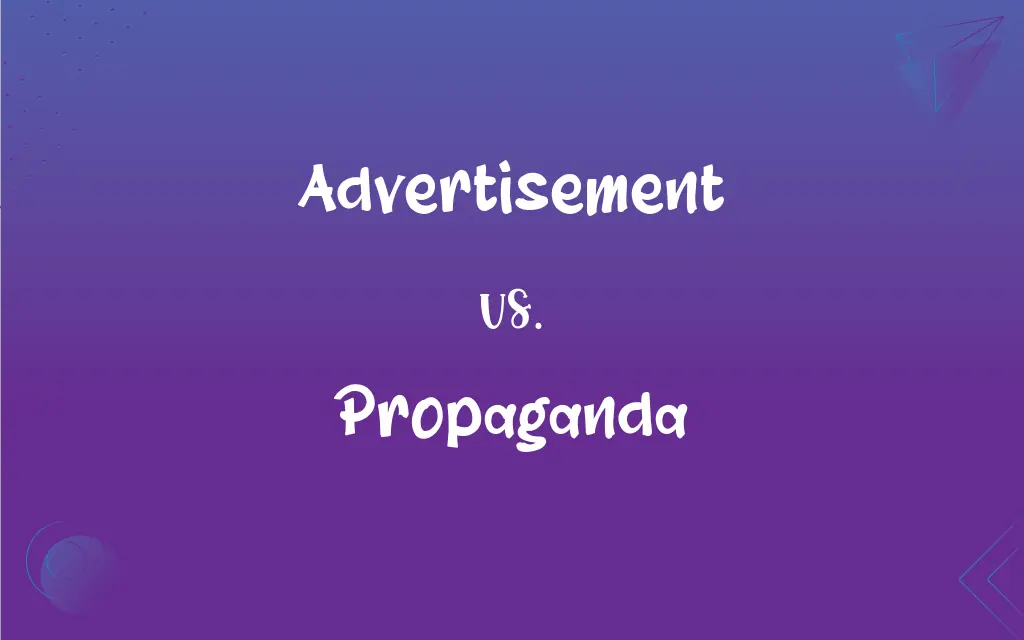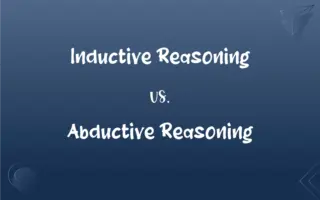Advertisement vs. Propaganda: What's the Difference?
Edited by Aimie Carlson || By Janet White || Published on December 27, 2023
Advertisement refers to promoting products/services. Propaganda refers to influencing opinions or beliefs, often politically.

Key Differences
Advertisement is a tool for promoting goods, services, or brands, focusing on commercial benefits. Propaganda aims to influence public opinion or behavior, often for political or ideological goals.
Advertisements are commonly found in media, designed to attract and persuade consumers. Propaganda, however, is often associated with governments or organizations seeking to sway public perception or attitudes.
The objective of advertisement is to boost sales or brand image, using facts and persuasive techniques. Propaganda tends to use emotional appeals and sometimes misleading information to shape beliefs or attitudes.
Advertisement operates in a commercial context, targeting specific market segments. Propaganda is broader, targeting societal beliefs and often involved in national or global contexts.
Ethically, advertisement is regulated to ensure truthfulness and consumer protection. Propaganda, on the other hand, may bypass ethical standards to achieve its objectives.
ADVERTISEMENT
Comparison Chart
Purpose
To promote products or services.
To influence public opinion or beliefs.
Context
Commercial and market-oriented.
Often political or ideological.
Techniques
Uses facts, persuasive techniques.
Employs emotional appeals, can be misleading.
Target
Specific consumer groups.
Broader public, societal beliefs.
Regulation
Subject to advertising standards and ethics.
May not adhere to ethical standards.
ADVERTISEMENT
Advertisement and Propaganda Definitions
Advertisement
A public promotion of products or services.
The advertisement for the new phone appeared in many magazines.
Propaganda
Often biased or misleading information.
The propaganda sought to discredit the opposition.
Advertisement
A medium for brand promotion.
The company's advertisement campaign boosted its visibility.
Propaganda
Used to promote a political cause or viewpoint.
The propaganda campaign was aimed at rallying support for the policy.
Advertisement
A message designed to persuade consumers.
The advertisement used catchy slogans to attract buyers.
Propaganda
A tool for ideological persuasion.
The propaganda promoted the party's ideology.
Advertisement
A tool for announcing offers or events.
The advertisement announced a big sale at the store.
Propaganda
Information spread to influence public opinion.
The government's propaganda emphasized national achievements.
Advertisement
Part of marketing strategies.
The advertisement was a key part of their marketing plan.
Propaganda
Can manipulate public perception.
The propaganda created a false image of unanimity.
Advertisement
The act of advertising.
Propaganda
The systematic propagation of a doctrine or cause or of information reflecting the views and interests of those advocating such a doctrine or cause.
Advertisement
A notice, such as a poster or a paid announcement in the print, broadcast, or electronic media, designed to attract public attention or patronage.
Propaganda
Material disseminated by the advocates or opponents of a doctrine or cause
Wartime propaganda.
Advertisement
(marketing) A commercial solicitation designed to sell some commodity, service or similar.
Companies try to sell their products using advertisements in form of placards, television spots and print publications.
Propaganda
A concerted set of messages aimed at influencing the opinions or behavior of large numbers of people.
Advertisement
A public notice.
The city council placed an advertisement in the local newspaper to inform its residents of the forthcoming roadworks.
Propaganda
A congregation of cardinals, established in 1622, charged with the management of missions.
Advertisement
A recommendation of a particular product, service or person.
The good manners and intelligence of the students are an advertisement for the school.
Propaganda
Hence, any organization or plan for spreading a particular doctrine or a system of principles.
Advertisement
(obsolete) Notoriety.
Propaganda
Information that is spread for the purpose of promoting some cause
Advertisement
(card games) In gin rummy, the discarding of a card of one's preferred suit so as to mislead the opponent into thinking you do not want it.
Advertisement
The act of informing or notifying; notification.
An advertisement of danger.
Advertisement
Admonition; advice; warning.
Therefore give me no counsel:My griefs cry louder than advertisement.
Advertisement
A public notice, especially a paid notice in some public print; anything that advertises; as, a newspaper containing many advertisements.
Advertisement
A public promotion of some product or service
FAQs
What is the main goal of an advertisement?
To increase sales or brand awareness.
Where are advertisements commonly found?
In media like TV, radio, online, and print.
What is the primary purpose of propaganda?
To shape public opinion or behavior.
What is an advertisement?
A promotion of products, services, or brands.
What defines propaganda?
Information spread to influence opinions or beliefs.
How do companies use advertisements?
For promoting products, services, and enhancing brand image.
What are common propaganda techniques?
Emotional appeals, selective truths, and sometimes misinformation.
What is the typical context for propaganda?
Political, social, or ideological campaigns.
What techniques do advertisements use?
Persuasive language, visuals, and emotional appeals.
Do all governments use propaganda?
Most use some form of propaganda, but the extent and methods vary.
Is all political messaging propaganda?
Not necessarily; it depends on the intent and methods used.
Is propaganda always truthful?
It can often contain biased or misleading information.
Can advertisements be a part of propaganda?
Yes, when they promote political or ideological messages.
Can propaganda be positive?
It can be, but it often has a manipulative or biased angle.
Is product placement a form of advertisement?
Yes, it's a subtle form of advertising in media.
How does propaganda affect society?
It can significantly influence public opinions and attitudes.
Are advertisements regulated?
Yes, by advertising standards and consumer protection laws.
Why is propaganda often viewed negatively?
Due to its association with manipulation and misinformation.
How do businesses measure advertisement success?
Through sales, brand recognition, and customer engagement.
Can advertisements be misleading?
They can be, but are subject to legal and ethical restrictions.
About Author
Written by
Janet WhiteJanet White has been an esteemed writer and blogger for Difference Wiki. Holding a Master's degree in Science and Medical Journalism from the prestigious Boston University, she has consistently demonstrated her expertise and passion for her field. When she's not immersed in her work, Janet relishes her time exercising, delving into a good book, and cherishing moments with friends and family.
Edited by
Aimie CarlsonAimie Carlson, holding a master's degree in English literature, is a fervent English language enthusiast. She lends her writing talents to Difference Wiki, a prominent website that specializes in comparisons, offering readers insightful analyses that both captivate and inform.






































































